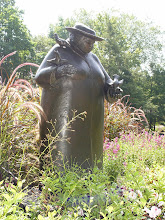What is it about wrens? Is it their willingness to live around humans, the way that they always seem to be busy and intent on something-or-other, or the angle of their tails that contributes an air of jauntiness? Whatever the reason, the sight of one never fails to make me smile.
Part of my delight in wrens is the fact that for years, I was the only gardener I knew who didn't have any. No warbling song welcoming me whenever I stepped outside, no hyperactive brown balls nesting in the hanging baskets, no LBBs busily checking all the plant stems for insects or eggs. Sparrows, cardinals, even goldfinches, but no wrens despite how common everyone else said they were. I developed a serious case of wren envy, a failing it would have embarrassed me to admit.
It wasn't only wrens that I lacked. In three successive gardens, I have failed miserably with marigolds, those ubiquitous annuals that proliferate everywhere else. If seedlings managed to survive downy mildew or damping-off, I would walk outside one morning to discover en entire patch wiped out by cutworms. Luckily, summer brings enough yellow flowers that marigolds aren't missed, and despising marigolds is intellectually respectable among gardening enthusiasts, but I have another serious failure: rudbeckias.
Every hillside in eastern North America seems to be covered with black-eyed Susans of some variety or other. Not my yard. The same places that killed marigolds (and gave me asters by the armload and Oriental lilies eight feet tall) left me Susan-less. My native plant gardens have flourished with coneflowers, Mexican hat, amsonias, and locally-endangered downy sunflowers that sowed themselves, but no cheerful roadside weeds. I did finally manage one scrawny patch last summer, to my great delight and that of the neighborhood finches and butterflies. This isn't fair. Other people rip rudbeckias out by the handfuls; I have fought the urge to rescue wilting clumps from heaps left by the street on trash day, apologizing to them with the explanation that they would merely have a more lingering death under my inept care.
But the situation may have changed. Not only do we have multiple wrens now, one of the flower beds left behind by the previous owner boasts a large clump of black-eyed Susans. Better yet, an examination of the weeds sprouting in the neglected grass of the front yard revealed dozens of baby Susan-seedlings. Some of those were transplanted last fall; others were left where they were--surely that area should be a garden, not part of a lawn. Surely if I ignore the little plants, they won't know that they're supposed to die on me.
Should we try marigolds? The Park Seed catalog shows a new variety that looks like an old-fashioned football mum.... Nah. No point pushing my luck.

1 comment:
Your post and your writing style made me smile. :)
Gotta love those wrens--but I'm really not into marigolds. :)
Post a Comment